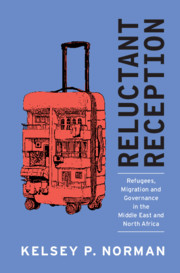Book contents
- Reluctant Reception
- Reluctant Reception
- Copyright page
- Dedication
- Epigraph
- Contents
- Figures
- Tables
- Acronyms
- Note on Translation
- Preface
- 1 Introduction
- 2 Host State Engagement in the Middle East and North Africa
- 3 Egypt
- 4 Morocco
- 5 Turkey
- 6 Differential Treatment by Nationality?
- 7 The Domestic Influence of International Actors
- 8 The Post-2015 Migration Paradigm in the Mediterranean
- 9 Conclusion and Avenues Forward
- Book part
- Notes
- References
- Index
6 - Differential Treatment by Nationality?
Ethnicity, Religion, and Race
Published online by Cambridge University Press: 26 November 2020
- Reluctant Reception
- Reluctant Reception
- Copyright page
- Dedication
- Epigraph
- Contents
- Figures
- Tables
- Acronyms
- Note on Translation
- Preface
- 1 Introduction
- 2 Host State Engagement in the Middle East and North Africa
- 3 Egypt
- 4 Morocco
- 5 Turkey
- 6 Differential Treatment by Nationality?
- 7 The Domestic Influence of International Actors
- 8 The Post-2015 Migration Paradigm in the Mediterranean
- 9 Conclusion and Avenues Forward
- Book part
- Notes
- References
- Index
Summary
Chapter 6 looks specifically at Egypt and Morocco to assess whether various nationalities of migrants and refugees experience differential treatment from the authorities of their respective host states, and what this says about the role of culture in affecting engagement policy choice. The theory of cultural embeddedness tells us that individuals considered to be co-culturals due to religious or ethnic background are more likely to receive preferential treatment in a host state, and the perception of shared culture is cited in the migration literature as a strong indicator of successful socioeconomic integration outcomes. Chapter 6 finds that while the perception of a migrant or refugee as a co-cultural in Egypt and Morocco can have a bearing on de jure preferential policies and some integration outcomes, other factors better explain de facto treatment toward individuals of different nationalities; namely, the length of time a migrant spends in a host state and whether he or she has legal status. It also demonstrates that any privileging of co-cultural migrants may actually emanate from a state’s diplomatic and political interests rather than as a result of cultural factors, suggesting that policies may be driven primarily by strategic decision-making rather than essentialist notions of culture.
- Type
- Chapter
- Information
- Reluctant ReceptionRefugees, Migration and Governance in the Middle East and North Africa, pp. 116 - 146Publisher: Cambridge University PressPrint publication year: 2020

